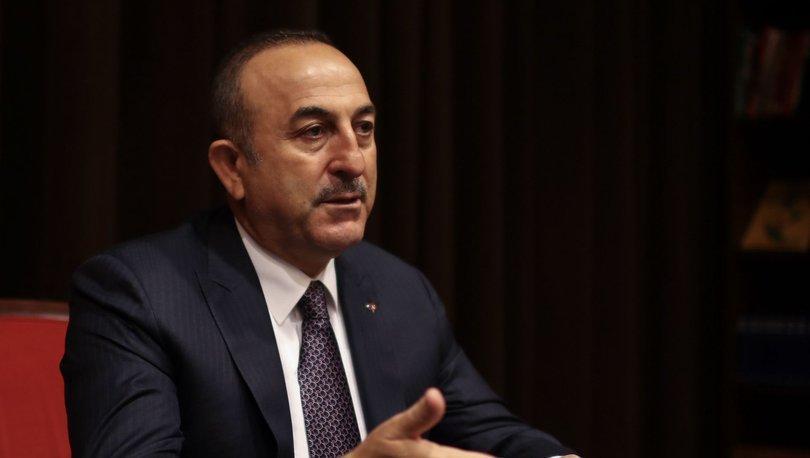Turkey urges to refrain from provocations in Black Sea
ANKARA

Turkish Foreign Minister Mevlüt Çavuşoğlu has expressed concerns about the escalation of tension in the Black Sea, warning that the parties should refrain from the provocations amid continued quarrel between Ukraine and Russia over the Donbas crisis.
“The rising tension in the region worries us all; provocations should be avoided. We must work hard to ensure that diplomacy and dialogue prevail,” Çavuşoğlu told in a video message he conveyed to a seminar about the trilateral cooperation between Turkey, Romania and Poland on April 21.
Çavuşoğlu’s message came as Ukraine and Russia are accusing each other of escalating tension in the region as the prominent Western powers, including the United States, have expressed their political support to the former. The United Kingdom is expected to dispatch a military vessel to the Black Sea in May in obvious support to Ukraine. Meanwhile Russian navy has intensified its mobility in the Black Sea through drills while deploying more than 100,000 troops along the Ukrainian border.
Recalling that the Black Sea has not witnessed a military confrontation even during the Second World War, Çavuşoğlu underlined that the primary reason for this was the sensitive balance created thanks to the 1936 Montreux Convention.
“We will for sure continue to implement the convention in an impartial and transparent way as we have been doing since 1936, but the convention alone is not sufficient to provide stability,” the minister said, warning that the provocative acts should be avoided.
He added that Turkey, Romania and Poland, all three NATO members, have remained committed to peace in the region and beyond.
The Montreux Convention limits the duration of the stay by 21 days and the tonnage of the military vessels from all non-littoral countries in the Black Sea. It does stipulate a free passage of all civilian vessels, but Turkey had imposed some restrictions on large tankers after some major accidents.
Turkish, Romanian, Polish ministers meet
Meanwhile, Çavuşoğlu will attend the annual trilateral meeting of the Turkish, Romanian and Polish foreign ministers that will take place on April 22 and 23 in Bucharest.
“In this context, the concrete areas of cooperation between the three Allies will be reviewed, and the possibilities to further deepen the partnership will be considered. As it coincides with the upcoming NATO Summit, this year’s meeting will also constitute an important opportunity to allow ministers to consult on their expectations from the summit,” the Foreign Ministry said in a written statement.
“On the other hand, foreign ministers of Ukraine and Georgia will also participate in one of the panels of the event,” it added.
Afghanistan peace talks postponed
Meanwhile, Çavuşoğlu announced on April 20 that it is postponing a much-anticipated Afghan peace conference in Istanbul until the end of the Muslim holy month of Ramadan.
"We thought that it would be beneficial to postpone it ...We consulted Qatar, the U.S. and the U.N. and decided to hold it after Ramadan and Eid festivities," Çavuşoğlu told the Habertürk news channel, adding there is "no need to hurry" after the recent decision by the U.S. to withdraw its troops.
The Eid al-Fitr holiday is due to follow Ramadan, which ends this year in mid-May.
The international conference, deemed essential for the war-torn country's future amid the withdrawal of foreign troops and escalating violence, was scheduled to be held from April 24 until May 4 in the Turkish metropolis.
"The conference would be meaningless without the Taliban joining. At the moment, we decided to postpone it since there is no clarity about the formation of the delegations and participation...The aim is not to initiate alternative talks to Doha but to contribute to the process. Hosting the meeting together in Istanbul will be Turkey, Qatar and the U.N.," he said.
Çavuşoğlu underlined that Turkey made efforts to conduct the meeting before May 1 as U.S. forces were initially supposed to be completely withdrawn from Afghanistan by that day.
Elections in Syria
Speaking on the Syrian regime's presidential election, Çavuşoğlu said the election "conducted on its own" would not be legitimate, adding nobody would recognize it.
Pointing out that the Syrian regime does not want a political solution, he said that it should realize that there will be no military solution and that it should attach importance to the political process.
He also highlighted that only an election after the political process would be legitimate and underlined the need to make legal arrangements and regulate the records in the country.
"Supporting an illegitimate election contradicts our principles," he added.
Syria has been ravaged by civil war since early 2011, when the Bashar al-Assad regime cracked down on pro-democracy protesters.
According to U.N. estimates, hundreds of thousands of people have been killed and more than 10 million displaced.
















